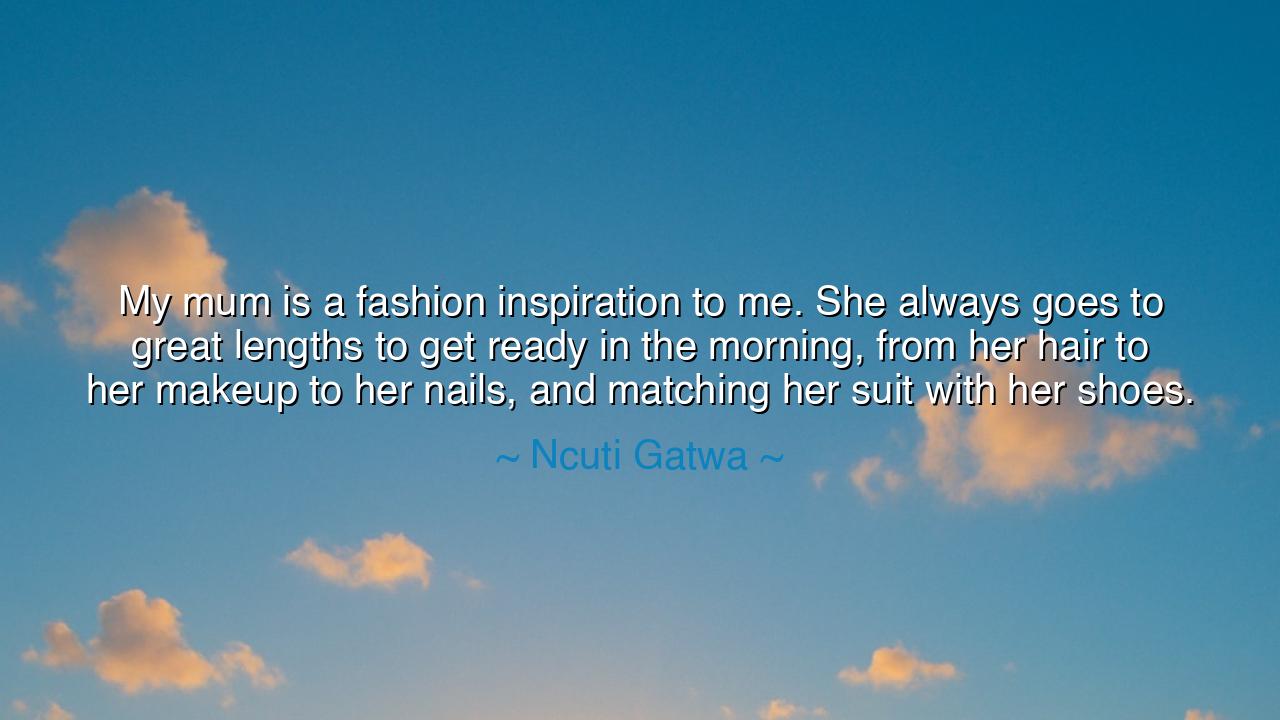
My mum is a fashion inspiration to me. She always goes to great
My mum is a fashion inspiration to me. She always goes to great lengths to get ready in the morning, from her hair to her makeup to her nails, and matching her suit with her shoes.






"My mum is a fashion inspiration to me. She always goes to great lengths to get ready in the morning, from her hair to her makeup to her nails, and matching her suit with her shoes." These words from Ncuti Gatwa speak to a profound admiration for the art of self-expression through fashion. To call one's mother an inspiration is not only a tribute to her personal style but to the power she embodies through her dedication to presenting herself to the world with purpose. The act of getting ready in the morning, of carefully choosing how to express oneself through appearance, is an ancient practice—one that has long been understood as a reflection of both inner strength and outward character. Gatwa’s words echo this timeless tradition of preparation, where clothing is more than just fabric; it is a story, a statement, and a form of self-empowerment.
In the ancient world, the way one dressed often told the story of their identity, their status, and their intentions. The Romans, for example, wore togas that signified their rank in society, and their attire was a reflection of their values and roles in the community. The powerful would adorn themselves with purple, a color reserved for those of the highest social standing, while the soldiers wore their armor with pride, representing their commitment to duty and honor. In these traditions, clothing was not just a choice—it was a symbol of who you were and how you wished to be seen. Just as Gatwa admires his mother for the effort she puts into her appearance, so too did the ancients understand that the way one presents themselves to the world is a reflection of their values and commitments.
Consider the legendary Cleopatra, the Queen of Egypt, whose clothing and adornment were central to her persona. Cleopatra's fashion choices, from her elaborate headdresses to her flowing robes, were not simply about beauty; they were deliberate acts of symbolism. Her clothing was a carefully crafted message to her people and to the rulers of Rome—she was not just a queen by birth but a force to be reckoned with, a woman of power, intelligence, and ambition. Every aspect of her appearance was intentional, speaking volumes about her ability to shape both her identity and the world around her. Ncuti Gatwa’s admiration for his mother’s attention to detail in fashion mirrors this ancient understanding of how personal appearance can shape and amplify personal power.
In the same vein, King Louis XIV of France, known as the Sun King, understood the importance of fashion in asserting his royalty and authority. His extravagant attire and the elaborate rituals surrounding his dress became symbols of his absolute power. The Louis XIV persona was not just built on military conquest or political maneuvering; it was a carefully crafted image of luxury, elegance, and divinity. His fashion choices—the embroidered robes, the lace cuffs, and the towering wigs—were not just a personal indulgence; they were a statement to the world that he was above all others, a monarch not just by right, but by the majesty of his appearance. Just as Gatwa acknowledges his mother's ability to command attention through her outfit choices, the great kings and queens of history knew that their attire was a vital expression of their power, their strength, and their self-possession.
The lesson in Ncuti Gatwa’s words is one of self-awareness and intentionality in how we present ourselves to the world. To be mindful of one’s appearance is not an act of vanity but an act of empowerment. Just as Gatwa’s mother takes great care to align her clothing and accessories, so too must we take care in how we express ourselves, for clothing is more than mere fabric—it is an extension of who we are, a manifestation of our inner strength and confidence. In every choice, from our morning routine to the way we dress for the world, we shape the way others perceive us and, more importantly, the way we perceive ourselves.
Just as Cleopatra and Louis XIV used their clothing to assert their identities and status, so must we use our style as a tool of self-expression, whether we are facing the world in a business suit, a uniform, or casual wear. The power of fashion lies in its ability to communicate without words—to present our values, our intentions, and our vision for the world. Whether we are preparing for a battle, an audience, or a simple day in our personal lives, the effort we put into our appearance speaks to our commitment and our respect for the roles we play.
The practical action we can take from this is to engage with our own self-expression intentionally. Just as Ncuti Gatwa’s mother does, we must take the time to dress with purpose—to consider how our clothes reflect not just our style but our identity. Each day is a new opportunity to embody the person we aspire to be, and our clothing should align with that vision. Whether preparing for a day of work, a family gathering, or a public appearance, we must approach our dress as an opportunity to present our best selves, to show the world that we are committed to our roles, and to express our confidence, dignity, and strength. Through this, we honor the ancient wisdom that how we present ourselves is a reflection of our inner power and the legacy we choose to create.






AAdministratorAdministrator
Welcome, honored guests. Please leave a comment, we will respond soon